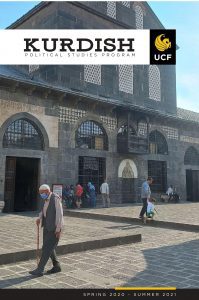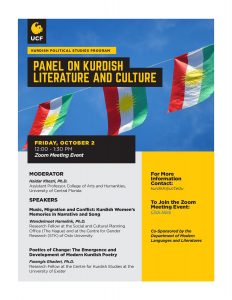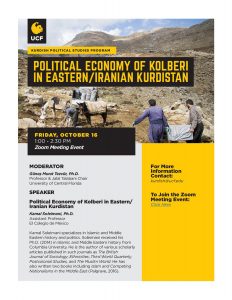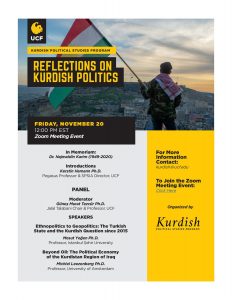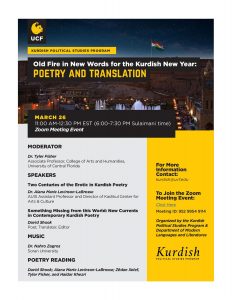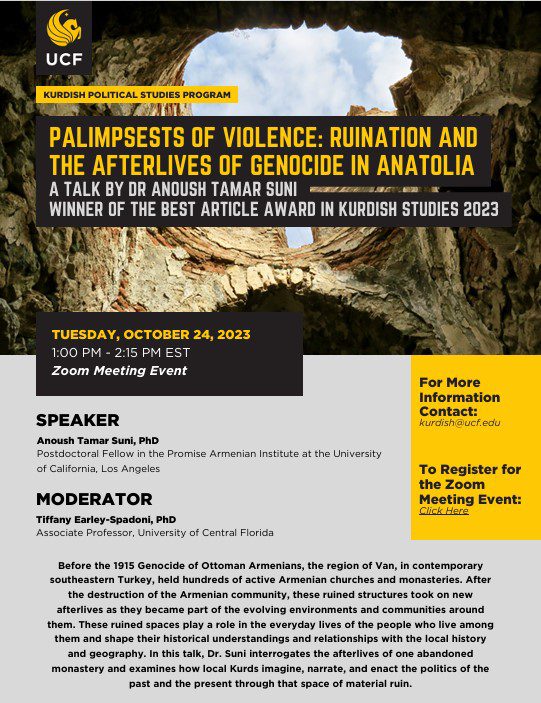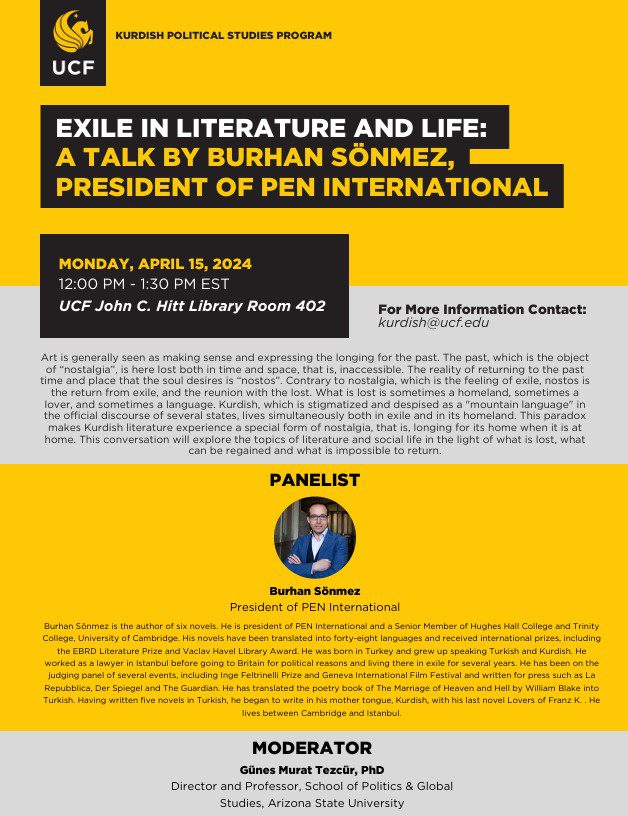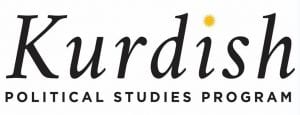
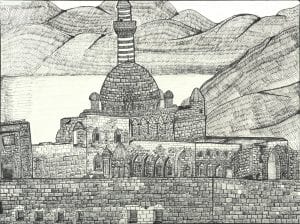
The Kurdish Political Studies Program (KPSP), hosted at the School of Politics, Security, and International Affairs, is the first and only academic program dedicated to the study of politics of Kurds and Kurdistan in the United States. KPSP promotes academic studies and public awareness of Kurdish politics, organizes events addressing contemporary issues affecting Kurdish people, facilitates exchanges and collaborations between UCF and Kurdish universities, and develops curriculum focusing on themes related to the Kurdish experience. KPSP is integrated with the Security Studies doctoral program. A review of KPSP activities from spring 2020 to summer 2021 could be found here.
KPSP is also the home of the Jalal Talabani Endowed Chair of Kurdish Political Studies, the only such position in the country, which was inaugurated on October 29, 2015. The mission of the Chair includes teaching, research and scholarly pursuits centering on Kurdish Political Studies, and further developing recognized excellence in that field. It also facilitates fellowships, distinguished visitors, public forums, courses, workshops and other offerings that objectively present and discuss policies and conditions affecting the security, peace and democratic governance of the Kurdish people, including episodes of mass violence such as the Anfal genocide.

Latest News
Announcement: Winner Spring 2024 Dr. Najmaldin Karim Research Fellowship in Kurdish Political Studies
This month, a committee of UCF faculty selected the Spring 2024 Dr. Najmaldin Karim Research fellow in Kurdish Studies. The program is delighted to announce Hannah Hillsgrove as the winner of this fellowship. Hannah is a promising undergraduate student at UCF pursuing a Bachelor of Arts in Political Science – International Relations. She is also part of the Burnett Honors College and pursues certificates in Russian as a Critical Language and in Kurdish Studies. She also conducted a study abroad in Azerbaijan while at UCF. She is planning to conduct her research for the fellowship as part of the Honors Undergraduate Thesis during the Spring 2024 semester under the supervision of Dr. Haidar Khezri with the working title of “The Kurds of Caucasus and the 2023 Nagorno-Karabakh Conflict.”
As a reminder, the Kurdish Political Studies Program (KPSP) sponsors the Dr. Najmaldin Karim Fellowship for undergraduate students at UCF. The fellow conducts a research project related to Kurdish politics, broadly defined, under the supervision of UCF faculty. This research has the aim of producing a final paper that is worthy of publication such as an article, a conference paper, or a thesis. The fellowship aims to enrich the fellow’s academic credentials, providing a unique opportunity to gain in-depth insights about Kurdish politics through independent research.
Announcement: The Best Article Award in Kurdish Studies
This award, sponsored by Kurdish Political Studies Program at the University of Central Florida, recognizes the best article in Kurdish Studies by a rising scholar during the previous calendar year. In this year’s competition, social science and humanities articles published by English language peer-reviewed journals in 2022 were considered. The prize for the winning article is $800. The selection committee was composed of Tiffany Earley-Spadoni (University of Central Florida), Ekrem Karakoc (Birmingham University), and Nikola Mirilovic (University of Central Florida).
The winner of the award is:
Suni, Anoush Tamar. 2023. “Palimpsests of Violence: Ruination and the Afterlives of Genocide in Anatolia.” Comparative Studies in Society and History 65(1): 192 – 218. Published online: 10/28/22. DOI: https://doi.org/10.1017/S001041752200041X
The committee also found the following article worthy of an honorable mention:
Mohammed, Sarwar and Tim Gray. 2022. “Political constraints on economic diversification in the Kurdistan Region of Iraq.” Energy Policy 171. https://doi.org/10.1016/j.enpol.2022.113274
Announcement: New KPSP Course Opportunity at UCF for Fall 2023
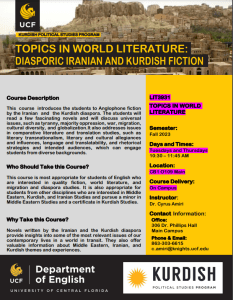
Latest Kurdish Political Studies Program Newsletter
The Kurdish Political Studies Program (KPSP) is delighted to announce the release of the latest newsletter, highlighting the programs projects and accomplishments over the past year. 2020 has been a difficult year for universities around the United States. Yet In the face of unprecedented and unique challenges brought by the pandemic, KPSP proved to be resilient. We continued to pursue a variety of activities contributing to greater scholarly understanding of Kurdish issues, facilitating intellectual exchanges, fostering international collaborations, and deepening student interest in Kurdish people and politics. Over the past year, the KPSP collaborated with a university in Iraqi Kurdistan to help organize the nation’s first Model United Nations, which is expected to improve the perspectives for global citizenship engagement in the region. We have also hosted several cultural and educational events dedicated to Kurdish poetry and literature, economics of the region, and Kurdish politics. Lastly, we have supported several Doctoral students who have successfully defended their theses, and welcomed new additions to our interdisciplinary research group. We invite you to find out more about these and other events in our newsletter.
Upcoming Events
There are no events at this timePrevious Events
Newsletter
Enter your information below to subscribe to our newsletter and be the first to hear about our upcoming events.
